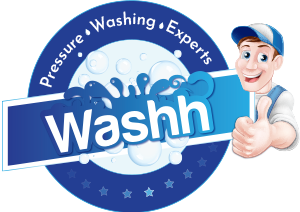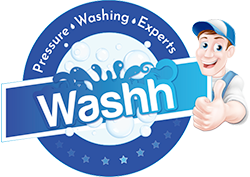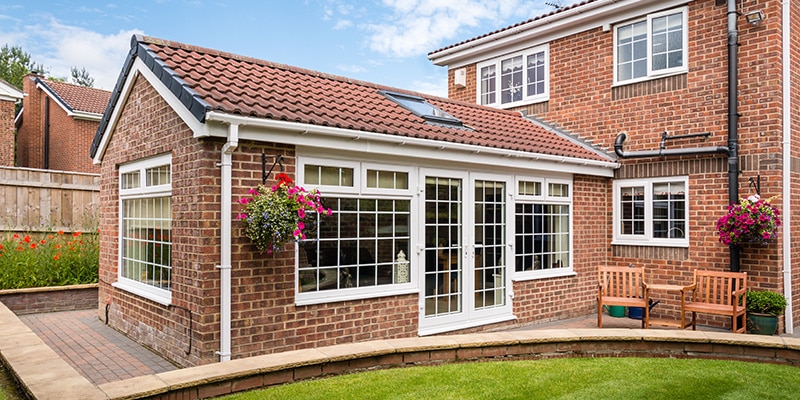Is it possible to pressure wash a brick house? Is pressure washing even a recommended method for cleaning brick surfaces? Let’s take a closer look.
Is It OK to Pressure Wash a Brick House?
Brick is a popular material used in many residential and commercial properties. It can easily elevate the appearance of any building and offers more durability than other materials. But, as with any material, brick requires cleaning and maintenance to maintain longevity. Over time, all sorts of pollutants — from dirt and grime to oil stains and algae — can stick to or fester on brick walls. And when it comes to cleaning, many immediately think of pressure washing.
While you certainly can use a pressure washer, the real question lies in whether you should. Should you pressure wash a brick house?
Different materials react differently to pressure washing. Pressure washing uses high force to blast away dirt and debris, so not all materials can take it. For instance, glass is very fragile and usually can’t be cleaned using a pressure washer on high. But what about brick? Is it recommended to pressure wash brick?
In general, yes. Pressure washing brick is an effective and efficient method of cleaning. However, it is not immune to high-pressure levels. While durable like concrete, brick is unable to withstand constant high pressure. This is especially true for older brick homes that may not be in the best condition.
Can You Power Wash Brick Walls?
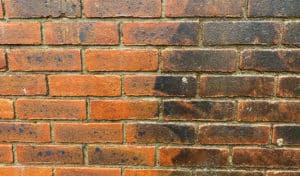 While pressure washing and power washing remain largely the same, the critical difference between the two methods is temperature. Power washing uses hot water and steam to clean surfaces, whereas pressure washing uses unheated water. Adding the element of heat makes for more effective results when cleaning things like oil and grease stains.
While pressure washing and power washing remain largely the same, the critical difference between the two methods is temperature. Power washing uses hot water and steam to clean surfaces, whereas pressure washing uses unheated water. Adding the element of heat makes for more effective results when cleaning things like oil and grease stains.
So, can you power wash a brick house? Can brick withstand hot water?
In a word, yes. You can power wash brick and masonry; hot water and steam allow for more comprehensive cleaning. If a brick surface has caked-in dirt, stubborn oil stains, and thick mold growth, power washing, accompanied by a good cleaning product, can make it look almost new again.
The Importance of Brick Cleaning
Some homeowners specifically choose to use bricks because they are low maintenance. Bricks don’t require paint or other treatments to maintain appearance and longevity. Plus, they are long-lasting and reliable.
But low maintenance does not mean “no maintenance.” Brick still requires regular cleaning because it can get dirty like every other construction material. Apart from dirt and grime, other pollutants that can stick to brick or grow on it include algae, mold, mildew, grease, and bird excrement. These pollutants are a health hazard and can age the property’s appearance, lowering its appeal and value.
Tips for How to Pressure Wash a Brick House
Pressure washing your brick home is a great way to clean it. But, it is important not to go in blind. You must arm yourself with the right knowledge if you want outstanding results without damaging your brick walls. Here are the best tips to pressure wash a brick home.
1. Avoid High Pressure
As previously explained, brick is durable but not to the point that it can resist extremely high pressure. Too high a pressure can damage the brick itself or the grout holding it together. As a result, the bricks can become loose and make the wall unstable. It can also cause water to penetrate the wall easier, weakening the brick further.
When pressure washing a brick house, start with a low-pressure setting at 500 PSI. From there, you can work your way up, though it is generally best not to exceed 2000 PSI. It is also essential to use the right nozzle tip for the job. Don’t use a narrow nozzle that will focus water too much in one area, as this may crack the grout or bricks. A nozzle that fans the water out is best.
2. Maintain the Right Distance
Even when you use a low-pressure level and a wider nozzle, staying too close to the brick surface when pressure washing can still cause damage. Distance plays a huge role in pressure washing, and when you point the wand too close to the surface, more force is involved. In comparison, keeping a suitable distance between the wand and the surface allows enough force to dislodge dirt and debris.
3. Say No to Muriatic Acid
You may feel tempted to use something strong like muriatic acid to clean your brick house. Resist that urge because muriatic acid only damages the outer surface and breaks down the mortar joints. This will let water into the mortar, weakening its state and causing it to crumble. Even if the brick is exceedingly dirty, don’t reach for muriatic acid or other damaging solutions such as ammonia and drain cleaners.
4. Skip the Wire Brush and Power Tools
Sometimes, you need to put some elbow grease into brick cleaning. Because you don’t want to cause any damage, using a lower PSI level to wash the brick is best. But, a lower PSI level does not always eliminate stubborn filth. For that, you need a brush.
When cleaning brick with a brush, use one with a natural or nylon bristle. Never use a wire brush or power tools to clean brick walls. Scrubbing with a wire brush can leave bits of metal behind. Over time, these metal bits will rust and stain the bricks. Wire brushes and power tools are also too harsh. They can strip away paint and finishes, leaving an uneven appearance.
Call on the Pros to Pressure Wash a Brick House
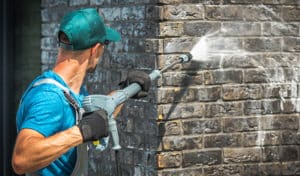 While there is nothing inherently wrong with cleaning bricks yourself, it is always better to hire a professional. A professional pressure washer can inspect the surface before cleaning and recommend appropriate action. They can also get the job done at half the time with minimal to no damage at all. If that’s not enough, professionals can access the right equipment and cleaning products that your local home improvement store doesn’t carry.
While there is nothing inherently wrong with cleaning bricks yourself, it is always better to hire a professional. A professional pressure washer can inspect the surface before cleaning and recommend appropriate action. They can also get the job done at half the time with minimal to no damage at all. If that’s not enough, professionals can access the right equipment and cleaning products that your local home improvement store doesn’t carry.
If you need professional brick pressure washing, Washh is your best option. Call us today at 704.321.8000 or contact us online to get a free estimate!
RELATED ARTICLES:
- What’s The Cost To Pressure Wash A House?
- How To Remove Rust With Pressure Washing
- How To Clean Concrete: Professional Pressure Washing vs DIY
